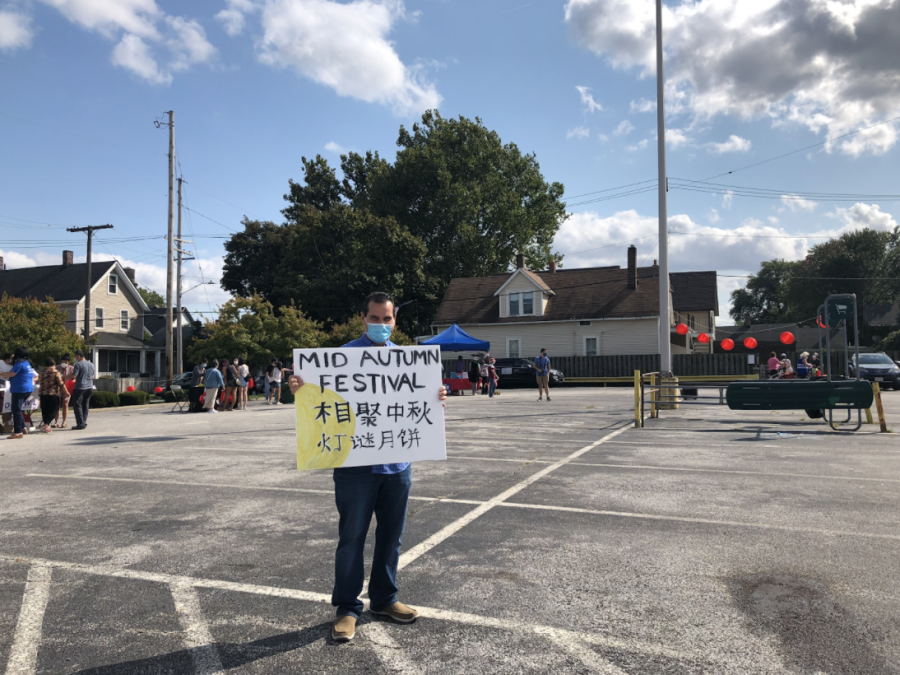AsiaTown holds a Mid-Autumn Festival for action
AsiaTown celebrates its Mid-Autumn Festival.
October 2, 2020
In the AsiaTown neighborhood of Cleveland, in a normally vacant parking lot, the Mid-Autumn Festival marked a concerted effort to make people more engaged with their community. Taking place on Saturday Sept. 26 from 2 p.m. to 5 p.m. in the former Dave’s parking lot, the festival took a different form than usual for this unusual year.
The Mid-Autumn Festival is traditionally celebrated across Asia in honor of the harvest moon, the largest full moon of the year, as well as the Chinese moon goddess, Chang’e, but this year the festival took full advantage of its timing to promote a call to action.
With only days to go before the 2020 Census Bureau concludes their operations and an election right around the corner, organizations like the Ohio Progressive Asian Women’s Leadership (OPAWL) and Cleveland VOTES, shifted the focus of the festival to civic engagement.
The festival, hosted by MidTown Cleveland Inc., gave attendees a paper passport at entry. If festivalgoers filled the passport with a stamp from every table in the parking lot, they would receive a mooncake from local AsiaTown business Koko Bakery. With that incentive in mind, each table encouraged the attendees to become more engaged in their community and to advocate for it, with one table signing people up for the census, another registering people to vote, another encouraging people to get involved in Cleveland Metroparks and yet another giving out surveys to get information on what people want from AsiaTown. Despite its small setting, the event represented a community coming together in uncertain times.
Karis Tzeng, the organizer of the festival and the project manager for AsiaTown at Midtown Cleveland, focused on the novelty, as well as the need for the event.
“This is kind of new, our AsiaTown team [at MidTown Cleveland inc.] is just over a year old, and we did a celebration for the Mid Autumn festival last year at the same location,” said Tzeng. “Then we were focused on making that parking lot a pop-up park, with tables and chairs and food trucks to help people envision the space as more than just a parking lot. This year, it was radically different and we focused it on making it a day of action. We are promoting the census, we are promoting voter registration and other ways to get involved civically.”
“Plus, we are doing a “strategic vision” process that is more community rooted, with a survey for understanding their vision, their values, their motivations in order to make the AsiaTown we want a reality,” continued Tzeng.
When asked about the effect of the COVID-19 pandemic on the planning of the event, Tzeng was quick to answer, stating, “There was a lot of wrestling about whether we should even do anything, but our team had the idea to do this walk-through event. We have these different stations that we spread out pretty far in the parking lot so people can be distanced, and made markings in the lot to direct flow and also of course mandated masks, plus gave masks out, as well as giving out hand sanitizer to anyone who may need it.”
The pandemic has had more effects on AsiaTown than just changing the layout of the festival however, with Tzeng explaining, “Businesses in AsiaTown were really impacted even before the shutdowns and saw large drops in traffic even as early as the end of Jan. and the beginning of Feb. when news of COVID spread and there was this frantic reaction due to xenophobia and racism to avoid Asian people and Asian-owned businesses.” Since then most of the shutdown measures have been relaxed and there is more understanding about the nature of the virus but even then Tzeng said, “Now all our businesses and restaurants are open again, but it is still slow.”
The pandemic, in some ways, has also brought the community together, with Tzeng stating, “We’ve definitely seen our community organizations partner together, like Asian Services in Action and we have been cross promoting with the Food Bank to make resources available to the community. That, along with partnering with the Organization of Chinese Americans (OCA) and OPAWL, has meant that we’ve seen the coming together of all our relationships with a real need to serve the community.” AsiaTown is looking out for its residents in meaningful ways, said Tzeng, “We’re also doing a program where we purchase bulk meals from restaurants in the neighborhood and provide groceries to the community every other week and make them available to anyone who needs food.”
Though times may be dark, with events like the Mid-Autumn Festival occurring and more community-wide engagement, Tzeng is looking towards the future.
“I hope AsiaTown continues to be a vibrant immigrant community, so that immigrants can come and feel welcome and comfortable in a place where you don’t have to speak English, where they are able to find food and grocery stores comfortable to them, and services they need,” said Tzeng. “I also want it to be a radically connected community, where people find places to gather and just enjoy their neighborhood, invest in it and sustain it for the future.”




